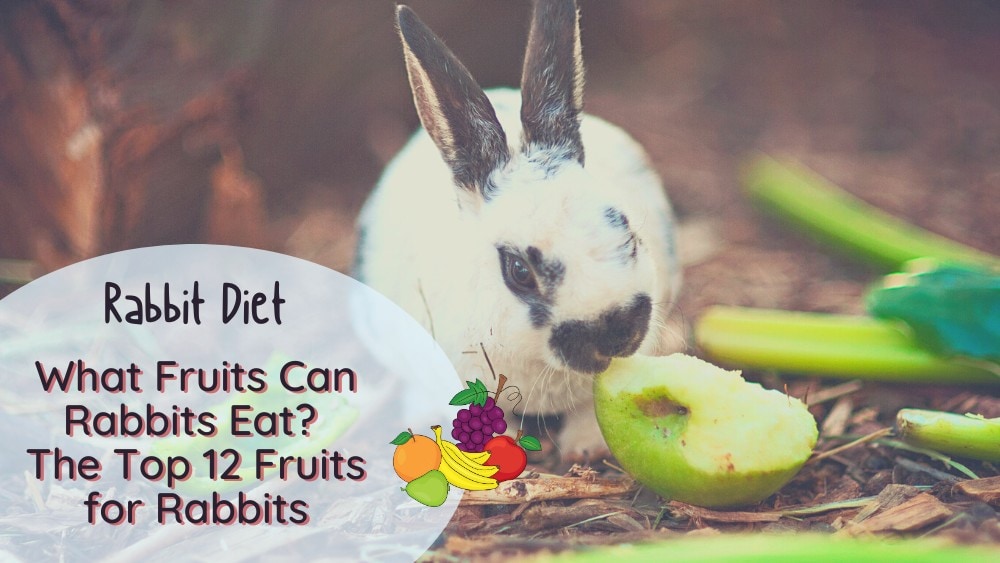Wild rabbits rarely eat fruit. They may nibble on fallen crabapples, but – since they can’t climb – don’t get much opportunity to indulge in sugary treats.
This doesn’t mean they won’t take the chance when it comes. Most rabbits love fruit and may even perform tricks for a chance at some pear or grapes.
Tiny amounts of safe fruit – like one tablespoonful per day– won’t hurt your bunny. But since rabbit guts aren’t adapted to a high-starch diet, large amounts of the fructose found in fruits can send them spiraling into GI stasis. And there are a couple of fruits – namely avocado and cocoa beans– that can kill them at first taste.
But you’re reading this because you want to know what fruits are safe to share with your rabbit. So, here’s a list of healthy fruits for bunnies and tips on how to feed them correctly.
What Fruit Can Rabbits Eat?
Rabbits can eat most fruits in small amounts. Unless your vet has told you otherwise, it’s safe to give your rabbit a 1-inch cube of:
- Stone fruits (peaches, plums, cherries, mango).
- Berries (strawberries, raspberries, blueberries, blackberries).
- Apples, pears, Asian pears, etc.
- Melons (watermelon, honeydew, cantaloupe, etc.)
- Tropical fruit (bananas, pineapple, kiwifruit, star fruit, papaya).
- Citrus fruits (use caution)
Make sure that any fruit you feed your rabbit is free of molds and pesticides
The Best Fruits for Rabbit Treats
These are the fruits I give my bunnies on rotation as treats.
1 – Blueberries
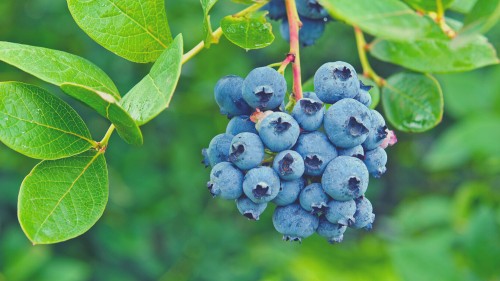
| Parts that are safe: | berries, seeds |
| How to feed: | wash and cut in half |
Blackberries are my #1 favorite rabbit treat because they are easy to grab, quick to prepare, and not as sugary as other options like mango. They’re super easy to ration. Small bunnies can have 2-4 blueberries per day and larger rabbits can eat a few more.
2 – Strawberries
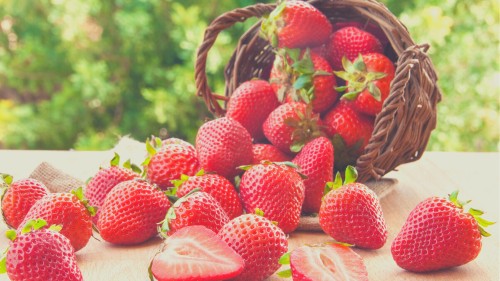
| Parts that are safe: | flesh, seeds, crowns, leaves |
| How to feed: | wash and cut in slices |
Like other berries, strawberries have lots of fiber– which means they are less likely to cause blood sugar spikes than fruits that have a high sugar-to-fiber ratio. They don’t contain nearly as much fiber as hay – so they can’t be a dietary staple – but they make a great treat. The biggest concerns with strawberries are that they mold quickly and their soft flesh absorbs pesticides easily.
3 – Watermelon
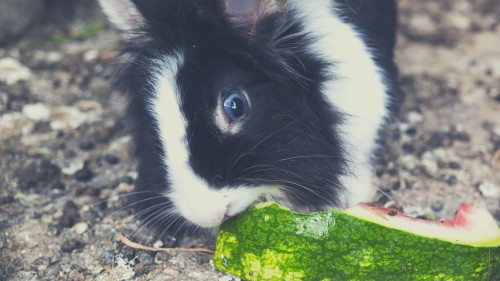
| Parts that are safe: | flesh, rind, leaves |
| How to feed: | deseed and cut into small cubes. |
Rabbits can eat watermelon flesh – and it’s adorable to watch the sticky juice run down their chins when they do. But watermelon rind is lower in sugar than the fruit and makes an even better bunny snack. Just be sure to wash or scrape any wax off the outer rind first before offering it.
4 – Cantaloupe
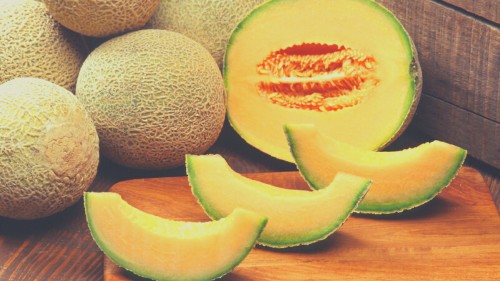
| Parts that are safe: | flesh, rind, leaves |
| How to feed: | deseed and cut into small pieces. |
This orange-fleshed melon – and its friends the muskmelon, honeydew, and canary melon – are safe for rabbits to eat. Don’t give your rabbit more than 1 tablespoon of melon per day – especially if it’s the first time your bunny has ever tried it. The rinds are safe for rabbits to gnaw on – but bunnies may not like them. The seeds pose a slight choking risk.
5 – Apple
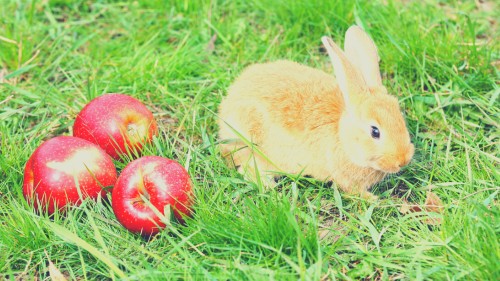
| Parts that are safe: | flesh, peel, stems, dried wood sticks |
| How to feed: | don’t peel, just wash and cut. |
Apple is another treat I give my rabbits frequently – just because it’s a staple in my son’s diet. I’ll let my bunny eat the peels or shave off a very small slice of the flesh for my rabbit to enjoy. We have an apple tree in our yard, so I know the ones we grow are free of pesticides. But commercially-grown apples may have high concentrations of concerning chemicals. Source your apples carefully.
6 – Pear
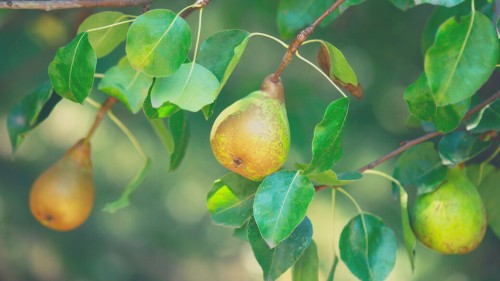
| Parts that are safe: | flesh, stems, skin |
| How to feed: | wash and cut into small slices |
All the common varieties of pears in US supermarkets are safe for rabbits. This includes Bartlett, d’Anjou, Bosc, and Asian pears. Rabbits can eat both the peels and the flesh, but be sure to scoop out the seeds first.
7 – Kiwi
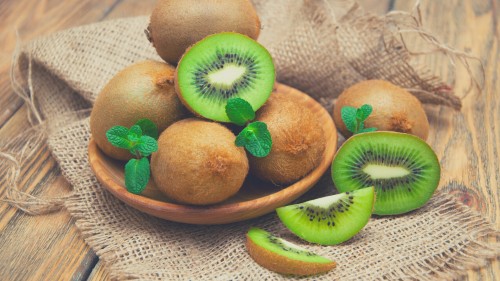
| Parts that are safe: | flesh, seeds, skin |
| How to feed: | wash and cut in cubes or slices |
Most people don’t eat the bristly skin of kiwifruit, but rabbits don’t seem to mind it! Kiwi skin is packed with fiber and the flesh contains enzymes that help with digestion.
8 – Pineapple
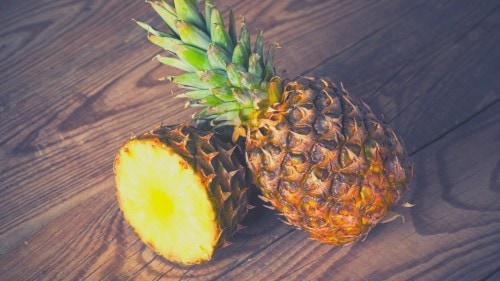
| Parts that are safe: | flesh, fresh or canned |
| How to feed: | remove skin and cut into small pieces |
Growing up in the show rabbit world, I always heard that feeding your rabbits pineapple will prevent fur block. Since doing more research, I’m not sure it’s that simple. But whether it’s the electrolytes or the enzymes in pineapple that do the trick, it has seemed to help some of my bunnies get through hot days.
9 – Grapes and Raisins
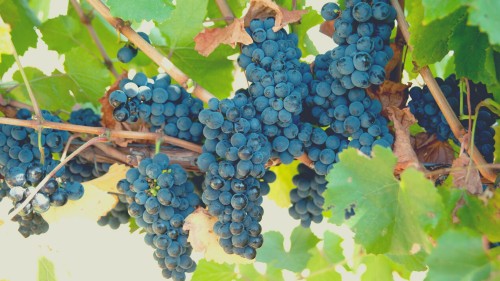
| Parts that are safe: | flesh, skin |
| How to feed: | wash and cut into very small pieces |
Grapes and raisins cause kidney failure in dogs – but not rabbits. Scientists don’t know why. Whatever the reason, your rabbit can enjoy 1-2 grapes or raisins as a treat without any ill effects. The sugar is very concentrated in these fruits, though. Read our guide on how to safely feed grapes to rabbits before making them a staple.
10 – Peaches, Plums, Apricots
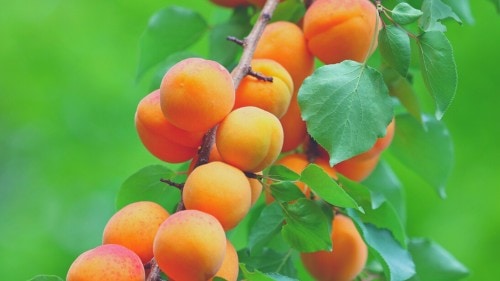
| Parts that are safe: | flesh, skin |
| How to feed: | wash and cut in small pieces |
Peaches, nectarines, plums, apricots, and cherries are called stone fruit for the huge “pit” or “stone” containing the seed at their centers. These pits can be poisonous if chewed or ground into powder – but who would give that to rabbits?? The flesh and skin of these fruits are safe for your bunny.
11 – Mango
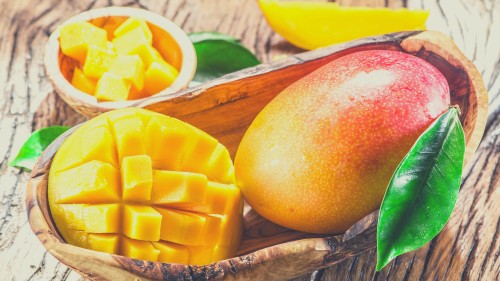
| Parts that are safe: | flesh, skin |
| How to feed: | wash and feed rabbits the peels. |
Mango flesh is so high in sugar that I usually skip it for my rabbits. It’s also very acidic, which could irritate some bunnies’ mouths. Instead, I like to give my bunnies mango peels. They are higher in fiber, so they’re healthier than the flesh but still have a sweet lining that makes them tempting to bunnies. Mangoes are on the EWG’s “Clean Fifteen” list of fruits and veggies, which means that they have less pesticide contamination than other fruits.
12 – Bananas
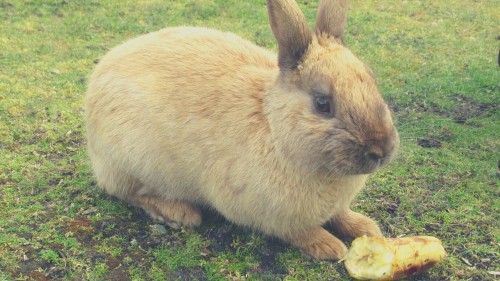
| Parts that are safe: | flesh, seeds, peel |
| How to feed: | small slices, with or without the skin |
Banana is another easy-peasy fruit to prepare that rabbits love. My bunnies would scarf down a quarter of a banana – peel and all – if I let them. I don’t, of course. 😉 But I love to offer a bite of banana while I groom my rabbits and watch them chew it in utter bliss.
Frequently Asked Questions
How Much Fruit Can a Rabbit Eat?
Adult rabbits should eat no more than 1 tablespoon of fruit per 5 pounds of body weight per day. Baby rabbits should not eat any fruit at all.
A rabbit’s digestive tract is designed to process a huge and constant supply of roughage-rich hay. Other types of carbohydrates– that is, starches and sugars – ferment differently than fiber and, when eaten in large amounts, can throw the gut microbiota out of balance. This can lead to GI stasis or even toxic shock when the bacterial population of a rabbit’s gut shifts rapidly.
It’s not always that drastic. Sometimes an excess of sugars in the diet lead to less noticeable (but still very detrimental) health problems like tooth decay or obesity.
What is the Best Fruit for Rabbits?
My favorite fruits for rabbits are blueberries, watermelon rinds, and kiwifruit. But there are lots of great options. Rabbits can eat most fruit in small amounts.
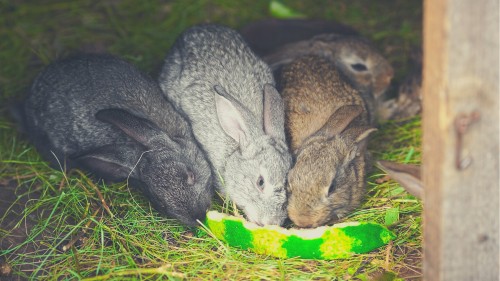
What Fruit is Dangerous for Rabbits?
Rabbits cannot eat avocados, not even a little bit. Avocados contain a chemical called persin that is toxic to bunnies. Coffee beans and cacao beans – technically fruits, not beans at all – contain caffeine and can be harmful to rabbits.
Rabbits can eat citrus fruits like oranges, grapefruit, or lemons. But these are very acidic and may cause mouth ulcers in some rabbits, so I tend to avoid them.
Final Thoughts
Rabbits can eat small portions of most fruits edible to humans. If a fruit you want to give your bunny isn’t on this list, use caution. Some fruits – like unripe lychee – are known to cause issues in some pets, but haven’t been thoroughly studied yet.
Always introduce new foods slowly. Discontinue a new treat if your rabbit stops pooping, has soft stools, or seems gassy at any time in the next couple of days after eating it. If your rabbit ever develops diarrhea, give your vet a call.
What’s your bunny’s favorite fruit? Drop an emoji in the comments to answer!


